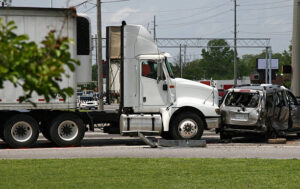When the Drug Enforcement Administration (DEA) announced a proposal to reclassify marijuana from a Schedule I to a Schedule III substance earlier this year, it sent puffs of concern throughout the trucking and other transportation industries.
The Truckload Carriers Association issued a statement on May 29, noting that the DEA’s proposal “is silent on what impact, if any, the reclassification of marijuana as a Schedule III drug will have on federally mandated drug testing for transportation workers.”
Federally certified laboratories offering drug tests to transportation employees, such as truck drivers, are not authorized to test for Schedule III controlled substances.
The Controlled Substances Act of 1971 created five Schedules that dictate how a drug is regulated under federal law. Schedule I drugs are subject to the most restrictive controls, while those down the scale are subject to more relaxed rules.
To be clear, rescheduling marijuana from I to III would not decriminalize the substance or make it legal for recreational use on the federal level.
The DEA’s public comment period for this rule change ended on July 22, and a final ruling will be issued after an administrative judge reviews the matter. As of this writing in mid-August, that review had not been scheduled.
Several trucking industry groups have spoken out against the reclassification, as has the National Transportation Safety Board (NTSB), saying they fear reclassifying marijuana would negatively impact highway safety.
During a late June hearing, U.S. Transportation Secretary Pete Buttigieg, seeking to calm fears surrounding the issue, said he anticipates that — if the drug is rescheduled — the Department of Transportation (DOT) will maintain the authority to conduct testing of marijuana use by commercial motor vehicle drivers and other safety-sensitive transportation workers.
In July, NTSB officials urged the DEA to ensure that any final rule to reschedule marijuana “does not compromise marijuana testing under DOT and Health and Human Services (HHS) procedures applicable to safety-sensitive transportation employees.”
Such employees include airline pilots, airline maintenance workers, bus and truck drivers, locomotive engineers, subway train operators, ship captains, pipeline operators, personnel transporting hazardous materials, air traffic controllers and others.
According to the NTSB, a safety “blind spot” would be created if the DEA reclassifies marijuana without taking steps to ensure that testing remains within the scope of pre-employment, random, reasonable suspicion, and post-accident drug testing.
“Removal of marijuana testing from DOT and HHS drug testing panels for safety-sensitive transportation employees would remove a layer of safety oversight that employers have been managing for decades, and it would prevent DOT and HHS drug testing from acting as a deterrent to marijuana use by those employees,” the NTSB said. “Additionally, the NTSB would no longer have DOT and federal workplace marijuana test results as evidence in our investigations.”
During a House Committee on Transportation and Infrastructure meeting in early July, Chris Spear, president and CEO of the American Trucking Associations (ATA), spoke out, saying that, if the trucking industry’s ability to conduct drug testing for marijuana use is restricted, a heightened risk of impaired drivers will threaten the nation’s roadways.
“DOT and ATA share the goals of achieving zero highway fatalities and ensuring the commercial driving workforce is qualified to safely operate, which is why we are committed to partnering with DOT to mitigate harmful impacts caused by the potential reclassification of marijuana,” Spear said.
Marijuana and alcohol remain the most-often-detected drugs in impaired driving crashes that result in serious or fatal injuries. Between 2000 and 2018, crash deaths involving marijuana more than doubled, from 9% to 21.5%. Immediately following Canada’s 2018 legalization of marijuana, that country’s emergency medical facilities saw a 94% increase in the rate of marijuana-involved traffic injuries.
During the same hearing, Rep. Rick Crawford (R-Arkansas), noted that he also has concerns about highway safety.
“Mr. Secretary, I think it’s safe to assume that the number of all impaired drivers on our roadways would increase,” Crawford said to Buttigieg. “Can you speak to what your department is doing to ensure that transportation workers in safety-reliant positions can continue to be tested for marijuana use if this proposal goes forward, and how your department plans to address transportation safety in light of (the Department of Justice’s) ruling?”
Buttigieg replied that his agency’s understanding of the reclassification proposal is that “it would not alter DOT’s marijuana testing requirements with respect to the regulated community.
“For private individuals who are performing safety-sensitive functions, subject to drug testing, marijuana is identified by name, not by reference to one of those classes,” he continued. “So even if it was in its classification, we do not believe that that would have a direct impact on that authority.”
Industry stakeholders and officials say they hope Buttigieg’s assessment is correct.
According to TCA’s statement on the reclassification issue, the proposed decision appears to be spurred by laws enacted by several states that “prohibit employers from taking adverse action against employees for off-duty use, even for safety-sensitive workers.”
In other words, workers in these states who lose their jobs for using marijuana while off duty can sue their former employers for wrongful termination and recover damages.
“Courts have not decided whether the DOT Drug and Alcohol Regulations preempt these types of state laws, especially considering the regulations allow carriers to send drivers to a substance abuse professional program instead of terminating the driver’s employment,” TCA’s statement noted. “Reclassifying marijuana as a Schedule III drug could create further uncertainty.”
In other words, there are currently more questions than answers.
This story originally appeared in the September/October 2024 edition of Truckload Authority, the official magazine of the Truckload Carriers Association.
Born in Pine Bluff, Arkansas, and raised in East Texas, John Worthen returned to his home state to attend college in 1998 and decided to make his life in The Natural State. Worthen is a 20-year veteran of the journalism industry and has covered just about every topic there is. He has a passion for writing and telling stories. He has worked as a beat reporter and bureau chief for a statewide newspaper and as managing editor of a regional newspaper in Arkansas. Additionally, Worthen has been a prolific freelance journalist for two decades, and has been published in several travel magazines and on travel websites.









Give me a break people are dying in crashes because they are high on marijuana. It just stays in their systems longer and you love to claim that’s the reason. But they aren’t actually impaired. It’s well past its time to allow truckers to smoke marijuana off duty just like they can drink off duty.
Give me a break people arent dying in crashes because they are high on marijuana. It just stays in their systems longer and you love to claim that’s the reason. But they aren’t actually impaired. It’s well past its time to allow truckers to smoke marijuana off duty just like they can drink off duty.
not being able to find a Good trucking job because of SAP programs for 5 years and constantly getting tested for Marijuana and paying SAP $60 a month for 5 years mean while unable to find a good trucking job because of SAP program, and you smoke off duty and the substance in your system yes it need to ends